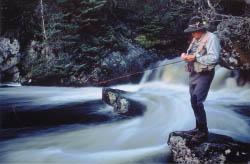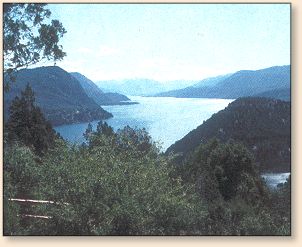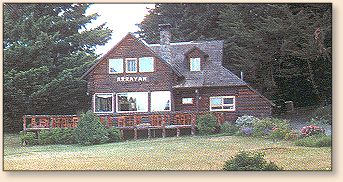Snowbirds in Patagonia

By Chris Marshall
Photo by Duncan Hardie
Arrayan
Ten Rivers & Ten Lakes outfitters operate out of
Arrayan Lodge, located on a hillside high above
San Martin de los Andes and Lake Lacar. The main
lodge was built in 1939 for British actress, Renee
Dickinson, who operated it as a lodge and tea house
until her death in 1943 at the age of 31. At the end
of WWII, her brother, Barney, who managed a local
ranch but was away flying with the RAF in England,
returned with his wife to take over the lodge,
which they turned into one of the most renowned
lodges in that part of Patagonia. Their daughter,
Janet, who became a local ski instructor, still
lives in the area.

Today, the new owners have reopened the main lodge
as a tea house and restaurant, and have built a new
lodge with luxury accommodation for eight in four
private, ensuite double rooms, and with a common,
glass-walled sitting room with bar and fireplace
at the top of an octagonal tower, offering panoramic
views of the lake and surrounding mountains. They
cater primarily for parties of fly fishers, but
also arrange hiking, horseback riding, climbing,
and rafting trips.

Fly fishers breakfast at the main lodge, are treated
to a sumptuous shore lunch, and return to the lodge
for a late gourmet dinner. Each trip can be customised
to provide the kind of fly fishing the guests prefer.
For full details visit their website at www.tenriverstenlakes.com
Getting There
We flew Air Canada to Miami and Aerolineas Argentinas
to Buenos Aries. However, a number of other North
American and European airlines fly into Buenos Aries.
Prices vary, so it's best to shop around. The flight
to Chapelco airport, just a 20 minute drive from San
Martin de los Andes, is provided by a local airline,
Austral Lineas Aereas. This flight leaves from the
local airport, a 45 minute drive across the city of
Buenos Aries. Ten Rivers and Ten Lakes outfitters
will meet you at Chapelco to drive you to the lodge.
Gear
For wading the rivers, outfits of 3wt - 6wt with floating
and sink tip lines are preferable. In ideal conditions,
it's possible to get away with a 6wt on the lakes and
when floating the big rivers, but to deal with the
frequent winds, it's best to take along a 7wt or 8wt
as well. A fully sinking line is also useful for
getting the fly down deep on the lakes.
For flies, take along a selection of streamers and Woolly
Buggers (weighted and unweighted), impressionistic nymphs
(especially dragonflies), hairwing caddis, Wulffs, Adams,
and tiny midges. However, the guides carry plenty of flies
with them, especially local patterns for matching the hatch.

The rivers are cool, but not cold enough to warrant
neoprene waders. Breathables with neoprene feet are
quite adequate, and they're also so much lighter and
less bulky for packing. Most of the rivers have sections
with slippery boulders, making sturdy, felt-soled wading
boots a necessity. Unless you prefer netting your own fish,
there's no need to take a net, as the guides always carry
one. One of the wonderful things about this part of Patagonia
is that there are no mosquitoes! We took repellent, but
never needed to use it. However, there are a few horseflies
and suffered the occasional bite. A stick of Afterbite
proved useful to relieve the itch. ~ Chris Marshall
Our Man In Canada Archives
|







